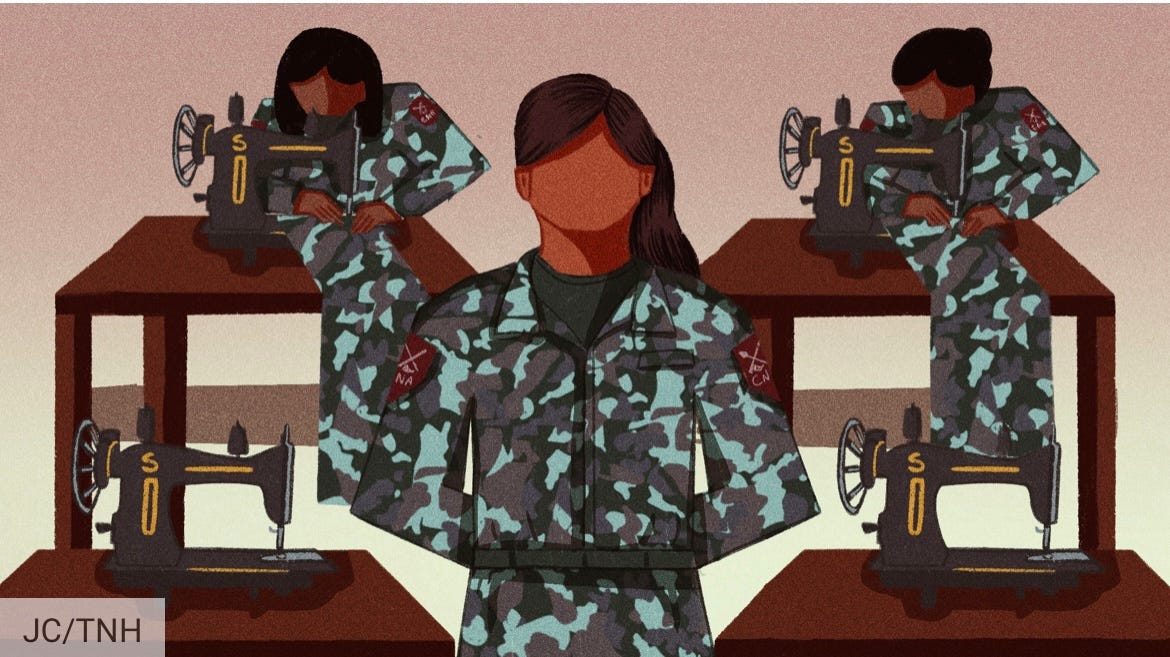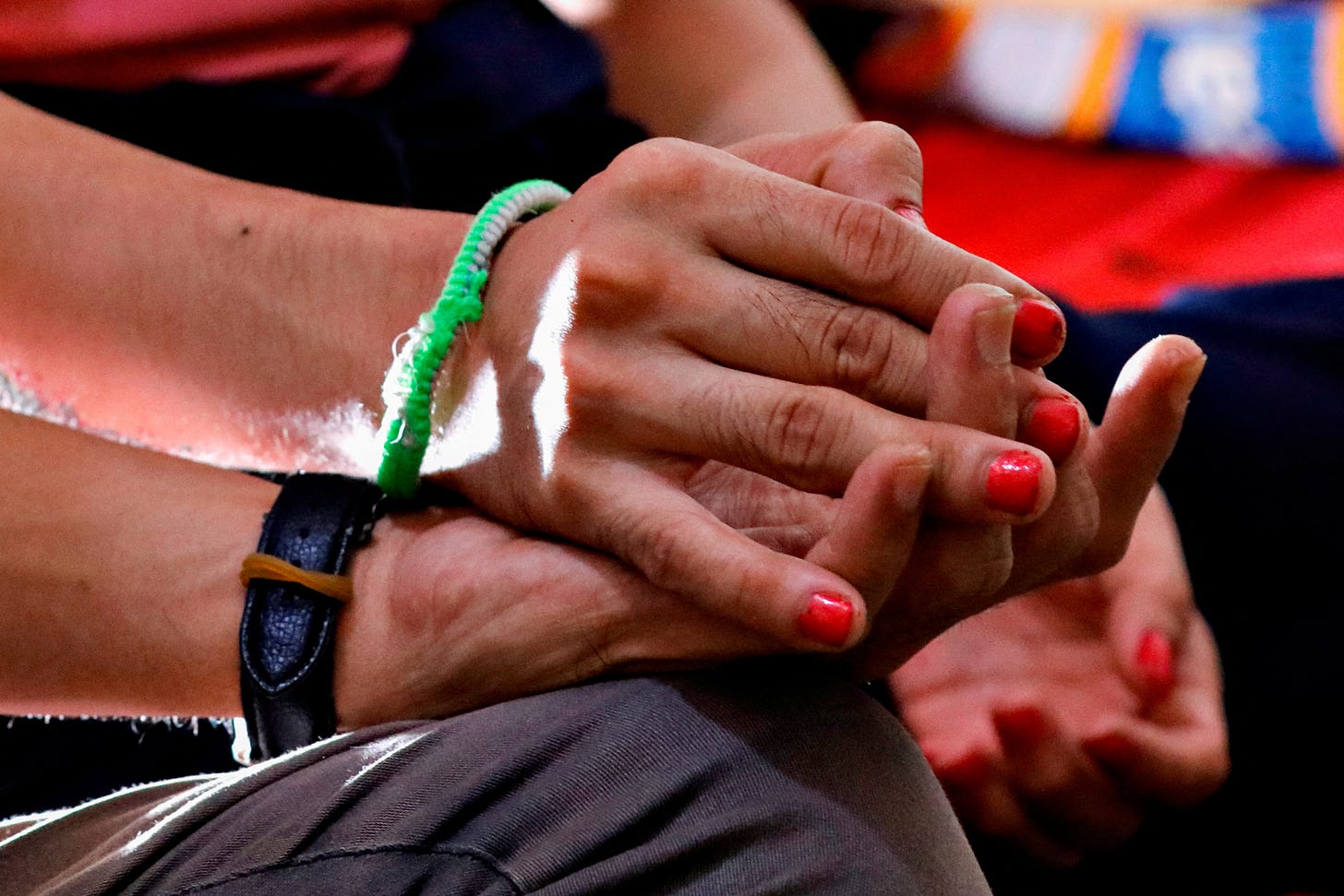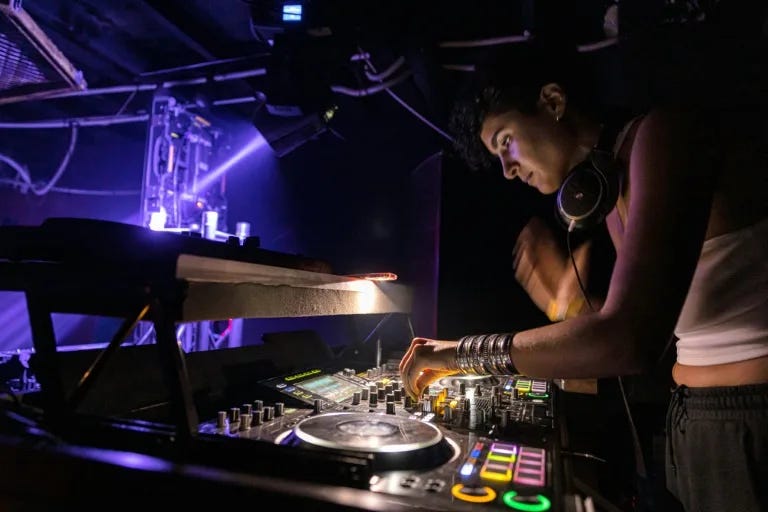Global Roundup: Myanmar Women vs Military Junta, Ghana’s Anti-LGBTIQ+ Bill, Indonesia Trans Community, Egypt Women DJs, Black Queer Rom-Com
Curated by FG Contributor Samiha Hossain
Via New Humanitarian
The women fighting Myanmar’s junta play a crucial role in the armed resistance, even if most are kept away from the front lines and given little say in decision-making. The Chin National Front (CNF) is fighting for an autonomous land for Chin people within a federal democratic union. It is also participating in Myanmar’s broader resistance to the military junta which seized power in February 2021. The New Humanitarian spoke with six women serving in the Chin National Front or in the allied Chin resistance groups established since the coup. Three of the women will be covered here.
Mai Rai Boel had worked with a civil society organization in Yangon focused on women’s empowerment since graduating university in 2019. Now she serves as the commander of the CNF’s uniform battalion. In her free time, she runs gender awareness training for other women in her camp. She discusses how her family did not want her to get involved in the resistance. However, she is passionate about women’s rights, particularly the intersectionality of gender and other issues like ethnicity and educational background, and hopes to break the “glass ceiling” women in the country face.
Even for women to be participating in this revolution is a strength. If many women participate, we can share our knowledge with each other, and our difficulties will gradually decrease. Our voices will be louder, and men will have to listen. -Mai Rai Boel
Mai Mai has been active in community work related to women’s issues since she was a university student. In the years leading up to the coup, she provided humanitarian support to conflict-displaced women in her township. She now serves as human resources coordinator for the CNF’s Department of Military Strategic Research and Development. She is also a co-organizer of monthly discussion circles for women in her camp.
Mai Mai discusses how women are not allowed to go on the front lines. As a young woman, sometimes men do not listen to her. She says that gender awareness is still relatively new in Myanmar and weak in practice especially. She wants people across the country to leave ideas of male dominance behind and see that women are capable of leading.
We aren’t only fighting an armed revolution; we are transforming the whole system. However much gender awareness we thought we had before, we all have a long way to go. The reason I became a women’s activist is that even we – women – don’t realize our own identities. -Mai Mai
Olivia Thawng Luai is currently Assistant General Secretary 2 of the Chin National Organisation/Chin National Defense Force. A former karate champion, she now uses these skills to train Chin resistance forces across the state. Luai talks about the difficulty of losing the people she trained and the violence she regularly witnesses. She is participating in this revolution not only to defeat the military, but also to unite Chin people who have been made to fight each other throughout history. Women face particular challenges living in the forest including managing their menstruation and finding a place to bathe in privacy. However, Luai recognizes that women have a lot to offer.
Angel Maxine, Ghana’s only openly transgender musician, says she will fight a new anti-LGBTIQ law. Photo Eemax Experience via openDemocracy
Ghana’s only openly trans musician Angel Maxine speaks out on the dangers of a proposed anti-LGBTIQ+ bill. Maxine’s song ‘Wo Fie’ meaning ‘your home’ in Twi, premiered in July 2021, a month after a hugely controversial bill criminalizing queer people and those who support their rights was leaked online. The music video opens with the words, “Ghana is colonially homophobic.”
The country’s Parliament will consider introducing the Promotion of Proper Human Sexual Rights and Ghanaian Family Values Bill, Africa’s most restrictive and archaic anti-LGBTQI+ bill, into law. Maxine fears for her life and believes she will be in jail for five or more years if the bill passes. Since 2019, major players in and outside of Ghana’s political system have been pushing for this law, which seeks to criminalize queer and gender-nonconforming expression and eradicate any public advocacy of queer rights. Maxine says the discrimination “felt more individual,” whereas now the whole community is under attack.
The bill’s introduction has sparked an increase in homophobic attacks across the country. For instance, in August 2022, the director of LGBTIQ+ rights group Rightify Ghana was kidnapped and beaten by homophobic vigilantes, who held him for a few days until a financial ransom was paid.
The bill hasn’t even been passed and you’re seeing more attacks on LGBT people online – imagine when it passes…[The] bill gives [people] the right to kill and destroy LGBT people. -Angel Maxine
Maxine also worries that Ghanaians “don’t know what they’re supporting,” as the bill itself is written in English and has not been translated into the Ghanaian languages, which has created a vacuum of misinformation. Perhaps the most dangerous element of the bill is the ‘duty to report.’ A person who suspects a family member, colleague or housemate to be queer is encouraged to report them to the police. Once reported, they could be imprisoned for up to five years for identifying or being perceived as LGBTIQ+.
Over the past 18 months, the bill has been debated in both the legal courts and the court of public opinion. After being reviewed by the Ghanaian Committee in Parliament to assess its constitutional validity, in November attorney general Godfred Dame stated that parts of the bill do “pass the test of constitutionality,” although others “violate some fundamental rights and freedoms enshrined in the constitution.” Parliament will now decide whether to amend the bill to remove these sections. The coming year will be one of huge struggle for Ghana’s queer communities – yet like other Ghanaian activists, Maxine remains committed to fighting.
I want to see queer Ghanaians living without fear. Knowing if you are attacked and you go to the police station, you will be believed and they won’t condemn you. We will win, because every day a queer person is born. -Angel Maxine
Chika, a 28-year-old trans woman who works as a busker holds her boyfriend's hand during an interview at their rented room in Jakarta, Indonesia, December 22, 2022. REUTERS/Ajeng Dinar Ulfiana
Trans Indonesian woman Chika Ananda Putrie, 28, saw some of her worst fears come true last month, when the country banned people from having sex outside marriage or even living together, at the risk of prison time. She says she is scared of getting caught living with her partner and being jailed.
When the legal changes take effect in three years, such unmarried couples, particularly in the LGBT community already under pressure from religious conservatives, will have to contend with the constant threat of being reported to police.
The first openly trans woman to hold public office in Indonesia warned that the law could foster latent homophobia or transphobia while adding risks for those who cannot get married.
The code does not break the chain of hate. The state rules over ... people's bedrooms too much. -Hendrika Mayora Victoria Kelan, provincial village official
Homosexuality is not illegal in Indonesia, except in the ultra-conservative, autonomous province of Aceh. Gender-fluid communities have historically been an accepted part of society. The Bugis ethnic group on Sulawesi island, for instance, traditionally recognizes five genders, including one that is said to "transcend," or combine, the female and male. But a rising tide of conservative Islam has swelled persecution of the LGBT community. LGBT advocacy group Arus Pelangi says that there has been an increase in case data every year in the last three years.
Like many 'waria,' a term combining the words for "woman" and "man" by which trans women describe themselves, Chika is worried that the discrimination she already faces will only be amplified when the new law is in effect.
Photo via AFP
A generation of women DJs are shaking up Egypt's underground electronic music scene. The country’s music industry remains male-dominated, while its cultural establishment marginalizes and even bans electronic music artists. Women party-goers for years have complained about harassment on the dance floor, while many revelers find mainstream venues too pricey. Now, a generation of young women DJs are forging their own path, seeking to create more inclusive spaces for performers and party-goers alike.
A small but vibrant electronic music scene is "booming" in the Egyptian capital, according to Yemeni music journalist and occasional DJ Hala K. Aspiring artists are taking inspiration from female DJs from the region, she added, such as Palestinian Sama Abdulhadi, who has performed from Egypt to France and at premier US festival Coachella.
A lot of female talents feel more confident and empowered to pursue DJing…[In Cairo, there are] powerful, talented women at the turntables: they know how to make people dance. -Hala K
DJ and promoter A7ba-L-Jelly decided to establish her own collective as part of making the underground electronic dance music scene more inclusive. She said she wanted to organize events where she would feel safe.
In some places in Egypt, where they play more commercial music... you won't enter because you are single, or because you don't look rich enough…I book male and female DJs to create dance floors that are inclusive in terms of music, gender and social class. - A7ba-L-Jelly
For France-based researcher Hajer Ben Boubaker, the lack of women DJs runs counter to Egypt's strong tradition of women performers. Despite women singers being well represented in the Arab cultural scene, they are barely represented in the Egyptian electro scene of mahraganat, which is the most popular music today. Mahraganat relies heavily on computer-generated and synthesized beats and features blunt lyrics that tackle topics including love, power and money. The country's musicians' union announced late last year it was abolishing the genre as part of a campaign to "preserve public taste." Yet, today’s rising young women DJs are adamant about taking up space and paving the way for future women DJs.
via them.us
Camryn Garrett’s latest YA novel, Friday I’m in Love, centers on Mahalia, a Black bisexual high-schooler who, after missing out on her dream sweet sixteen, decides to plan something even better: An extravagant coming-out party all about celebrating her queerness on her own terms. Garrett, who recently graduated from NYU’s film school, effortlessly pays homage to her favorite teen rom-com classics such as 10 Things I Hate About You, Say Anything and The Breakfast Club – however, in contrast to the whiteness of those films, Friday I’m in Love is all about two Black girls falling in love. Ahead of her book’s publication, Garrett spoke to Them.
Garrett wrote the first draft of Friday I’m in Love in high school but she says writing the story was a challenge at the time because she did not feel queer enough. She was much more confident in her “messy identity” when she picked it up again a few years later.
I really want people to realize there’s not one perfect way to be queer. I think we realize this as we get older, but even with the way people talk about these things online, it may seem like there are boxes to check off or a test to pass and there simply aren’t. -Camryn Garrett
Garrett includes a dedication to fanfiction writer @Lingeringlillies “for showing me the type of queer woman I wanted to be without even knowing my name.” in her book. She says that fanfiction exposed her to a lot of queerness. She describes Lingering Lillies as a “calming steady presence” who would give her advice on Tumblr.
Friday I’m in Love sounds like a refreshing take on some classic rom-coms and the representation will undoubtedly be meaningful for queer youth.
Samiha Hossain (she/her) is a student at the University of Ottawa. She has experience working with survivors of sexual violence in her community, as well as conducting research on gender-based violence. A lot of her time is spent learning about and critically engaging with intersectional feminism, transformative justice and disability justice.
Samiha firmly believes in the power of connecting with people and listening to their stories to create solidarity and heal as a community. She refuses to let anyone thwart her imagination when it comes to envisioning a radically different future full of care webs, nurturance and collective liberation.






